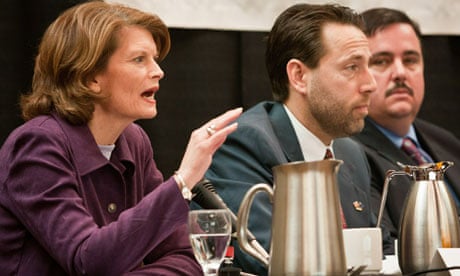Sarah Palin and other prominent right-wingers will today rush to the aid of the beleaguered Tea Party-backed candidate for the US Senate, Joe Miller, after newly released documents reveal he lied about a computer tampering scandal.
The row has created alarm about the election chances of Miller, until recently regarded as a safe Republican bet to win the Alaska race.
Palin is to attend a rally with Miller today and other rightwingers are to participate by video, including Mike Huckabee, one of the likely contenders for the Republican presidential nomination, Michele Bachmann, the outspoken congresswoman, and Jim DeMint, the Republican senator and godfather of the Tea Party.
The Republicans are on course to win control of the House in Tuesday's mid-term elections. According to the polls, they also have an outside chance of taking the Senate, but they cannot afford to lose Alaska, which had been considered a banker.
Miller, in personnel files released late on Tuesday, admitted lying about the computer scandal. In 2008, working as a lawyer for a borough in Fairbanks, Alaska, he used the computers of fellow government workers to vote in an online political poll, itself a breach of ethical policy. He then cleared lots of material from the computers to cover his tracks, and in the process deleted their passwords and saved websites.
In a memo at the time to his then boss, another lawyer, Rene Broker, Miller said: "I lied about accessing all of the computers. I then admitted about accessing the computers, but lied about what I was doing. Finally, I admitted what I did."
The documents were only released after legal action by the Associated Press, the Anchorage Daily News and other US media. Miller had been trying to block their release.
In the memo, he said: "I acknowledge that my access to others' computers was wrong, participating in the poll was wrong, lying was wrong, and there is absolutely no excuse for any of it."
He was placed on leave while the incident was investigated and then suspended for three days, placed on six-month probation and referred to an employee help programme. A disciplinary letter said: "Finally, I expect that you will work hard to rebuild the coworker relationships that were harmed due to your actions on March 12, 2008. It will take effort on your part to regain their trust."
The disclosure of the documents comes after weeks of strained relations between Miller and the media. Miller, like many other Tea Party candidates, has tried to keep his distance, preferring to spend on ads rather than giving interviews. The poor media relations reached a new low last week when a reporter was handcuffed by security at one of his campaign events.
Miller, speaking on release of the documents, said: "I appear to be the only candidate in this Senate race whose entire life history matters to the media."
Defeat for Miller would be a setback for Palin and the Tea Party, both of whom helped him in the Republican primary to unseat the incumbent, Lisa Murkowski, a mainstream Republican. Palin has a personal grudge against Murkowski, seeing her original selection for the Senate as nepotism.
Miller is well ahead of the Democratic candidate, but Murkowski, though not officially on the ballot, has asked supporters to write in her name and that campaign has taken off. In a RealClear Politics poll average, she is only 1% behind Miller, who is on 35%.
If Murkowski won, it would not matter to the Republican party and, to a large extent, would be privately welcomed by the party establishement. The danger is that the divided Republican vote might allow the Democrat, Scott McAdams, to slip through to victory, but it is a slim chance, with RealClear Politics putting him on only 25%.

Comments (…)
Sign in or create your Guardian account to join the discussion